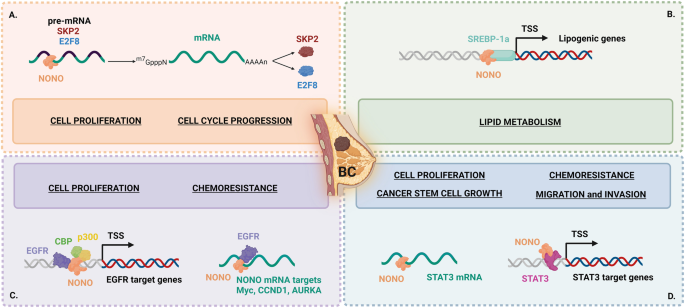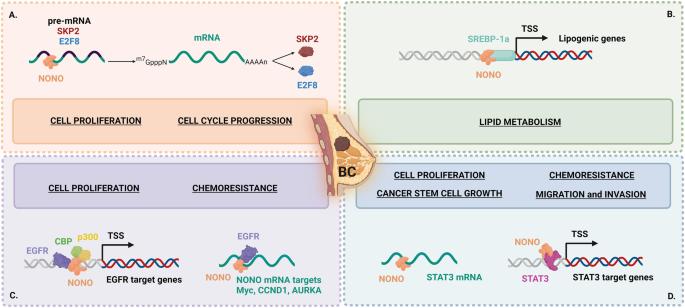The pleiotropic nature of NONO, a master regulator of essential biological pathways in cancers
IF 4.8
3区 医学
Q1 BIOTECHNOLOGY & APPLIED MICROBIOLOGY
引用次数: 0
Abstract
NONO is a member of the Drosophila behavior/human splicing (DBHS) family of proteins. NONO is a multifunctional protein that acts as a “molecular scaffold” to carry out versatile biological activities in many aspects of gene regulation, cell proliferation, apoptosis, migration, DNA damage repair, and maintaining cellular circadian rhythm coupled to the cell cycle. Besides these physiological activities, emerging evidence strongly indicates that NONO-altered expression levels promote tumorigenesis. In addition, NONO can undergo various post-transcriptional or post-translational modifications, including alternative splicing, phosphorylation, methylation, and acetylation, whose impact on cancer remains largely to be elucidated. Overall, altered NONO expression and/or activities are a common feature in cancer. This review provides an integrated scenario of the current understanding of the molecular mechanisms and the biological processes affected by NONO in different tumor contexts, suggesting that a better elucidation of the pleiotropic functions of NONO in physiology and tumorigenesis will make it a potential therapeutic target in cancer. In this respect, due to the complex landscape of NONO activities and interactions, we highlight caveats that must be considered during experimental planning and data interpretation of NONO studies.


癌症重要生物通路的主调控因子 NONO 的多效性。
NONO 是果蝇行为/人类剪接(DBHS)蛋白家族的成员。NONO 是一种多功能蛋白质,它作为一种 "分子支架",在基因调控、细胞增殖、细胞凋亡、迁移、DNA 损伤修复以及维持细胞昼夜节律与细胞周期耦合等许多方面发挥着多功能生物活性。除了这些生理活动外,新出现的证据还有力地表明,NONO 表达水平的改变会促进肿瘤的发生。此外,NONO 还会发生各种转录后或翻译后修饰,包括替代剪接、磷酸化、甲基化和乙酰化,这些修饰对癌症的影响在很大程度上仍有待阐明。总体而言,NONO表达和/或活性的改变是癌症的共同特征。本综述综合介绍了目前对 NONO 在不同肿瘤背景下影响分子机制和生物过程的理解,表明更好地阐明 NONO 在生理学和肿瘤发生过程中的多重功能将使其成为癌症的潜在治疗靶点。在这方面,由于 NONO 活性和相互作用的复杂性,我们强调了在 NONO 研究的实验计划和数据解释过程中必须考虑的注意事项。
本文章由计算机程序翻译,如有差异,请以英文原文为准。
求助全文
约1分钟内获得全文
求助全文
来源期刊

Cancer gene therapy
医学-生物工程与应用微生物
CiteScore
10.20
自引率
0.00%
发文量
150
审稿时长
4-8 weeks
期刊介绍:
Cancer Gene Therapy is the essential gene and cellular therapy resource for cancer researchers and clinicians, keeping readers up to date with the latest developments in gene and cellular therapies for cancer. The journal publishes original laboratory and clinical research papers, case reports and review articles. Publication topics include RNAi approaches, drug resistance, hematopoietic progenitor cell gene transfer, cancer stem cells, cellular therapies, homologous recombination, ribozyme technology, antisense technology, tumor immunotherapy and tumor suppressors, translational research, cancer therapy, gene delivery systems (viral and non-viral), anti-gene therapy (antisense, siRNA & ribozymes), apoptosis; mechanisms and therapies, vaccine development, immunology and immunotherapy, DNA synthesis and repair.
Cancer Gene Therapy publishes the results of laboratory investigations, preclinical studies, and clinical trials in the field of gene transfer/gene therapy and cellular therapies as applied to cancer research. Types of articles published include original research articles; case reports; brief communications; review articles in the main fields of drug resistance/sensitivity, gene therapy, cellular therapy, tumor suppressor and anti-oncogene therapy, cytokine/tumor immunotherapy, etc.; industry perspectives; and letters to the editor.
 求助内容:
求助内容: 应助结果提醒方式:
应助结果提醒方式:


